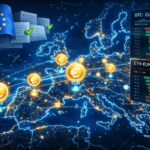WLFI NK probe: Democrats target Trump over sanctions
The controversy surrounding Trump’s crypto venture, World Liberty Financial (WLFI), has rapidly escalated into a major political and regulatory flashpoint. Democrats, led by Senators Elizabeth Warren and Jack Reed, are pushing for the Department of Justice and the Treasury Department to investigate whether WLFI sold its tokens to wallets linked to North Korean hackers, Russian sanctions-evaders, an Iranian exchange, and users of Tornado Cash during the period in which it was under U.S. sanctions. Their concern stems from a report by watchdog group Accountable.US, which analyzed blockchain transactions and claimed WLFI’s governance token sale was accessed by dozens of high-risk wallets associated with some of America’s most heavily sanctioned actors. For lawmakers, that isn’t just a crypto compliance issue it’s a national-security alarm bell, especially because entities tied to Donald Trump and his family reportedly receive 75% of WLFI’s token-sale profits and hold tens of billions of WLFI tokens themselves.
WLFI presents itself as a modern crypto-finance platform offering tokens that grant governance rights and participation in a tokenized financial ecosystem. The project has raised hundreds of millions of dollars already, including a significant commitment from a UAE-based investor. But the heart of the criticism is that token sales appear to have flowed to wallets connected directly or indirectly to the Lazarus Group, Russia-linked ruble instruments described as sanctions-evasion tools, and an Iranian exchange flagged in past enforcement actions. While this doesn’t mean WLFI knowingly took money from hostile governments, U.S. sanctions law often operates on strict liability. That means a company can face civil penalties even if it didn’t intend to transact with sanctioned parties, as long as the funds crossing its system are linked to blocked entities.
The senators argue that WLFI’s KYC and AML systems should have prevented such purchases. WLFI, on the other hand, insists it does screen buyers and has frozen hundreds of suspicious accounts, including a large Justin Sun-associated wallet. Critics counter that if WLFI had strong controls, these high-risk transactions wouldn’t have occurred in the first place. The issue becomes even more sensitive because WLFI uses governance tokens meaning buyers don’t just invest; they gain influence. For policymakers, the idea of wallets tied to North Korean hackers or Russian financial networks holding voting rights inside a Trump-affiliated platform raises major red flags. It creates the appearance, fair or not, that foreign adversaries could buy influence however small in a system financially connected to a former president.
Beyond immediate political drama, the case underscores larger concerns about how governance tokens interact with sanctions laws. Decentralized governance was never designed with geopolitical adversaries in mind, but the WLFI situation forces regulators to consider what happens when tokenized voting power becomes entangled with foreign influence or opaque funding sources. Crypto projects have long relied on the idea that “code is law,” yet the WLFI episode shows how quickly real-world compliance expectations override ideological frameworks when national security is involved.
Regulators have several potential avenues if they decide action is warranted. Treasury’s OFAC could freeze tainted funds, impose civil penalties, or require large-scale compliance reforms. DOJ could pursue criminal cases only if there is evidence of willful wrongdoing, such as intentionally circumventing sanctions controls. The SEC could also revisit whether WLFI’s token qualifies as a security, which would introduce a completely different set of legal hurdles. Politically, some have speculated whether this could become ammunition in larger debates about Trump’s business dealings, but any impeachment-level implications would require evidence of misuse of presidential powers, not just sloppy compliance at a crypto firm.
This controversy arrives at a moment when global concern about North Korea’s crypto-enabled hacking operations is higher than ever. The Lazarus Group has been linked to billions of dollars in theft, and U.S. officials argue that stolen crypto directly funds weapons programs. That makes the WLFI allegations especially explosive. Even indirect exposure becomes politically radioactive when connected to a former president, and that’s why Warren and Reed are treating the issue as urgent and serious rather than rhetorical campaign fodder.
For the broader crypto industry, the WLFI drama serves as a wake-up call. Governance tokens, foreign buyers, politically exposed persons, and decentralized platforms are no longer outside the scope of national-security enforcement. Token issuers may now face expectations to implement thorough screening, enhanced KYC, and governance safeguards. The days of open, unrestricted token sales especially for governance assets are likely numbered. Whether WLFI is eventually cleared or penalized, its predicament marks a turning point in how Washington views crypto projects at the intersection of politics, sanctions, and global risk.
In the end, this isn’t just a story about Trump or Democrats or one crypto platform. It’s a real time test of how digital assets fit into a world where financial flows, geopolitical conflict, and political interests now overlap. WLFI may be caught in the middle, but the implications stretch far beyond a single token.






















